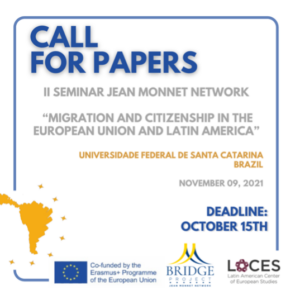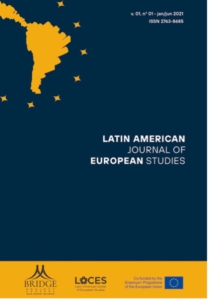Views
Nothing Found
Sorry, no posts matched your criteria
News
Online event on 11 and 12 August: Perspectives and Challenges of the New Borderless Law Practice.
The Brazilian Association of Internationalist Lawyers (ABRINTER) will hold on August 11 and 12 its 1st Cycle of Lectures with the theme “Perspectives and Challenges of the New Borderless Law Practice” (in Portuguese).
The event brings 27 lectures on various topics involving law and international private law practice, and celebrates the cooperation protocols signed by the Brazilian association and the Federation of Young Lawyers from Mexico (Mexico) and the Algarve Law Association (Portugal).
Registration is free of charge. To register access the ABRINTER’s website: https://www.abrinter.adv.br/
Call for papers: II Jean Monnet Network – BRIDGE Seminar on “Migration and Citizenship in the European Union and Latin America”

The Jean Monnet Network – BRIDGE project, cofunded by EU Erasmus+ Programme, and the Latin American Center of European Studies invite the academic community to submit scientific papers to the Workshop event of the II Jean Monnet Network Seminar on “Migration and Citizenship in the European Union and Latin America”, which will be held virtually on the 9 November 2021, hosted by the Federal University of Santa Catarina (Brazil).
The selected articles will be invited to publish in the Latin American Journal of European Studies or in the Collection of the Workshop. The top two articles will also receive an award of EUR 250 each.
Those who are interested must submit the article by 15 October 2021 to the email: network@eurolatinstudies.com.
More information here.
First issue of 2021’s Latin American Journal of European Studies

The first issue of the Latin American Journal of European Studies (ISSN 2763-8685) has just been published. It is an open access publication of the Latin American Center of European Studies, created by the BRIDGE Project of Jean Monnet Network with funding from the Erasmus + Program of the European Commission.
The main purpose of the Journal is to publish research related to the European Union Law and Policies and International Relations of the European Union with third countries and Latin America to create new knowledge, build bridges of dialogue, as well exchange good practices between these regions.
The second issue of the Journal is open to submission until November 1st, 2021 and contains a thematic dossier on Migration and Citizenship in the EU and Latin America.
The 2021-1 edition includes the following articles:
Dossier: EU-Latin America trade and investment relations
Las relaciones Eurolatinoamericanas en el marco de la nueva política comercial de la Unión Europea, p. 14-37
Carlos Francisco Molina del Pozo
Environmental conditionality in Eu-Latin America trade relations, p. 38-63
Giulia D’Agnone
El derecho de los tratados en el arbitraje de inversión intra-Unión Europea, p. 64-108
Rafael Tamayo-Álvarez
Gabriela Teresita Mastaglia
Uma década de política europeia de investimento estrangeiro: balanço e perspectivas futuras, p. 139-156
Maria João Palma
Silvia Simonit
La integración Centroamericana y el acuerdo de asociación entre esa región y la Unión Europea, p. 200-230
Nancy Eunice Alas Moreno
Marcel Zernikow
Nuno Cunha Rodrigues
Articles
Beatriz Graziano Chow; Clarisse Laupman Ferraz Lima
A União Europeia e a questão Turco-Cipriota: aspectos normativos, geopolíticos e migratórios, p. 319-354
Clarice Rangel Schreiner; Eveline Vieira Brigido; Roberto Rodolfo Georg Uebel
Interview
Jamile Bergamaschine Mata Diz
The full edition is available here.



